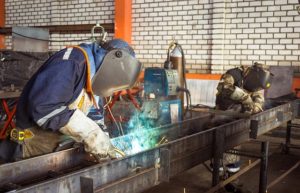
The Philippine manufacturing sector worsened in July as ongoing lockdown restrictions caused new orders to decline and export demand to weaken sharply even as foreign markets began relaxing COVID-19 measures.
After a recovery in June, the Purchasing Managers Index (PMI) dropped to 48.4 in July from 49.7 in June, signaling a moderate decline in operating conditions, according to the latest survey of IHS Markit.
READ: Quarantine easing lifts PH manufacturing in June
The headline index fell for the first time since April after approaching the 50 growth threshold at the end of the second quarter, IHS Markit said.
A reading above 50 indicates an expansion of the manufacturing sector compared to the previous month; below 50 represents a contraction, while 50 indicates no change.
The recovery in output levels stalled in July as parts of the country such as Manila and Cebu experienced further lockdown restrictions. Production declined only modestly, but still erased the slight improvement seen in June amid steps to reopen the economy.
Furthermore, manufacturers saw new orders decline for the fifth consecutive month, with the contraction rate quickening for the first time since April. While modest, the decline signaled clients’ continued uncertainty and hesitance to purchase, IHS Markit said.
The downturn was also driven by a much more severe fall in new export orders during July. While foreign markets have relaxed COVID-19 measures, ongoing restrictions in Philippine cities have meant some firms were unable to sell to external customers.
Supply of raw materials was again stretched in July, contributing to limited production and lower sales. Delivery times lengthened markedly as suppliers continued to operate with smaller workforces. Road checkpoints and lack of air freight services also made it difficult to acquire inputs.
“The latest Philippines Manufacturing PMI data showed that conditions are yet to improve at the start of the third quarter,” IHS Markit economist David Owen said in a statement.
“As parts of the country remained under lockdown, goods producers appeared to lose out in terms of foreign trade, as new export sales fell dramatically despite the relative easing of global restrictions. While domestic demand may stabilize, it will be important for businesses to re-strengthen foreign sales in order to recover from this period of (likely) deep recession,” he added.
IHS Markit forecasts a -6% annual drop in Philippine gross domestic product in the second quarter.
A renewed fall in production led companies to reduce procurement of inputs in the latest survey period. Stocks of both raw materials and finished items were depleted, partly in an effort to cut inventory costs.
Meanwhile, business expectations for the coming 12 months weakened for the first time since March in July, as less than half of all respondents gave a positive prediction for output growth. Companies that were more pessimistic expect COVID-19 to have a long-term impact on production, while others hoped that demand would increase once restrictions were fully lifted and consumer confidence improved.





